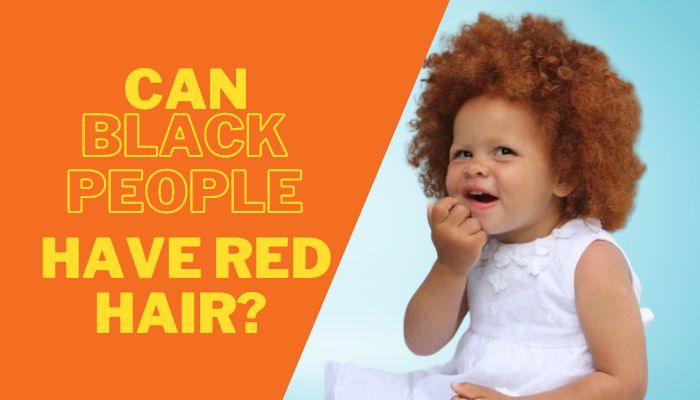People with red hair are rare, especially in Africa. This fact has raised the question if black people can have red hair.
Now to answer the question, can black people have red hair? Yes, black people or Africans can have red hair, although exceptionally representing 1 to 2 percent of the entire African population.
Yes, because I once shared a dormitory with a red-haired girl in Senior High School. Akorfa is dark skinned, hails from Hohoe in the Volta Region of Ghana, both parents are Ghanaians too. Her mother is slightly red haired, her father however has black hair.
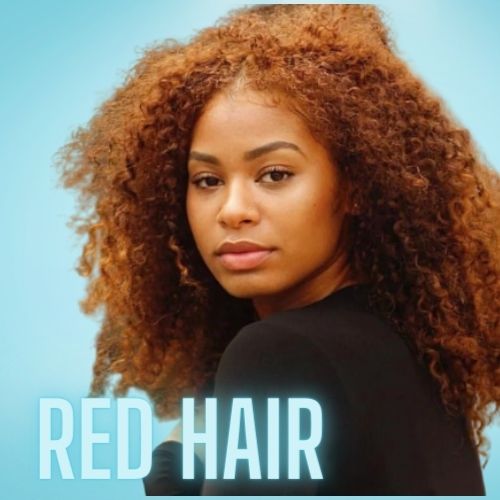
One time when her family visited her on campus, we discovered her sister also had red hair but her brother had black hair.
What may be the cause of these disparities among parents and their children? Join me for a long discussion as we deliberate on the causes of red hair, the health conditions of red haired blacks, some misconceptions and cool facts about redheads.
Also Read: Is Black People’s Blood Different? Everything You Need to Know!
Causes of Red Hair in Black People
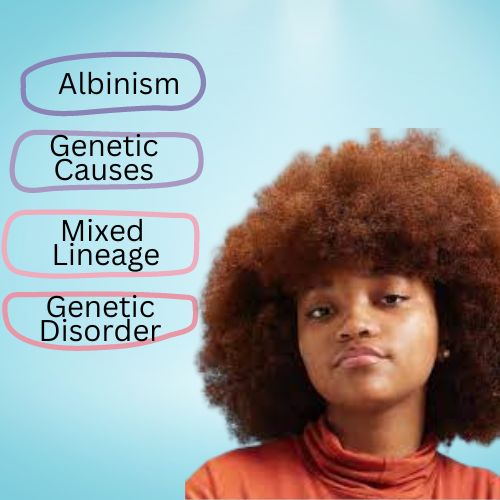
1. Albinism
Incredibly the conversation on causes of red ranges from genetic to mixed lineage. However, the most common cause of red hair in blacks is albinism; a genetic condition characterized by a reduction in melanin or skin pigment.
Someone who has Albinism usually has lighter skin, hair, and eyes, and mostly dark sunglasses when outdoors.
Albinism on its own has different types. The type of Albinism called Oculocutaneous Albinism (OCA3) that leads to red hair is scientifically referred to as rufous Albinism. This form of Albinism causes rufous pigmentation in people ensuing characteristics such as red hair, brown or blue eyes and a golden or bronze skin color.
Rufous albinism is a mutation of the TYR1 gene that stabilizes the production of melanin in the skin. Making melanin requires lots of special proteins called enzymes. Enzymes are proteins that can bind to a chemical or protein and make a chemical reaction happen. They’re the workers on the assembly lines of your cells.
A mutation can happen in the gene coding for any one of the enzymes involved in making melanin, leading to the enzyme not doing its job. Depending on how far into the process of making melanin that enzyme is, the end product will be different.
The protein made by this TYR1 gene is thought to be involved in bringing together all the enzymes needed to make brown melanin. Notably, this condition does happen naturally in Africa, resulting in red hair that completely lacks brown melanin.
2. Genetic Causes
Often, red hair is caused by a mutation in the melanocortin-1 receptor (MCR1) gene, a gene that all humans have. The mutated MCR1 gene triggers the generation of an excessive quantity of pheomelanin, which causes the physical characteristics common to red-haired people; freckles, lighter skin tones, gray, brown, or green eyes.
A child born red haired biologically, have their mother and father mutated MCR1 gene, either from their parents or grandparents to great-grandparents. It must run in the family!
Overall, however, people of African descent have MCR1 genetic mutations in very small numbers and it is rarer than apple trees in Ghana.
3. Mixed Lineage
Correspondingly, red hair can be a result of mixed lineage or interracial. Despite the appearance of many blacks in the diaspora, only a few are pure Africans. Majority of blacks with red hair are of mixed lineage descent; with Northern or Southern European ancestry.
This means that if a woman of Northern or Southern descent marries a man from Africa, it is likely the child will have red hair.
If you’ve ever taken an African ancestry DNA test or watched someone else reveal their true lineage, you know how surprising it can be.
4. Environmental causes
Historically, the first red hair gene was found in Africa, specifically Morocco and Algeria 60,000 years ago, migrating towards Asia and later spreading to Australia, Russia and Europe. As the gene spread throughout Europe, a younger variant of the red hair gene originated in Europe 30,000 years ago.
Indisputably, the environment some Africans find themselves in causes red hair too. It has to do with vitamin D.
The reason white people are the most likely to get red hair has to do with their environment. Northern Europe is a place where low light conditions would exist for a larger part of the year, depriving inhabitants of Vitamin D of sunlight absorption.
The two countries with the highest number of redheads in the world are Scotland and Ireland. Scientists believe Scotland’s dark, rainy weather may be partially responsible for the proliferation of redheads.
Even if you yourself are not redheaded in Scotland, there is a fighting chance you are a carrier of the recessive MC1R mutation and if you have a child with another person that has it, you will give birth to a little carroty headed baby.
In the sunny streets of Cape Town in South Africa, you will be surprised to see quite a few redheads. One of the reasons for this is that in the 17th century Scottish people emigrated to South Africa, the USA, New Zealand, and elsewhere in the British Isles. By the late 18th and early 19th centuries, emigration increased due to unrest and due to Scottish Universities overproducing.
Thus the prospects for jobs were not easy. The climate on the Cape Frontier was an attractive alternative as the harsh living conditions in the Cape would be a good match for the Scots – and so they came.
5. Genetic Disorder
In rare cases across children in Africa, red hair can be associated with disease or genetic disorder. This may be due to severe malnutrition; a deficiency, excess, or imbalance of energy and other nutrients necessary for healthy body growth.
Normally when this malnutrition occurs, dark human hair may turn red or blonde, or gingerly. The condition, part of a syndrome known as kwashiorkor, is a sign of critical starvation caused chiefly by protein deficiency and is common during periods of famine.
Health Conditions in Redheaded People
Blacks with red hair have an enviable lighter skin tone, sometimes sans blemish. But they have underlying health conditions, unfortunately.
i. Increased risk of cancer.
Red haired Africans are at a disadvantaged risk of cancer, specifically, melanoma. This is due to, sadly, the non-binding of the mutated MCR1 to the PTEN gene, correctly. Consequently, red-haired people don’t have as much natural protection from this type of cancer as dark-haired people do. It’s for this reason that it’s always recommended for redheads to be especially careful when outside in the sun.
ii. Unsightly birthmarks.
Red-haired people deal with large birthmarks more often than non-red-haired people. Sometimes, in blacks, the birthmarks are so large that they cover more than half of the body, leaving dark spots on their faces. Though this is rare, it disproportionately affects people with red hair.
iii. Increased incidence of Parkinson’s disease
Not only are red-haired people at an increased risk of skin cancer, but they’re also more likely to develop Parkinson’s disease; a disorder in the central nervous system that affects movement or tremor in the hands causing dopamine levels to drop.
Scientists have found that those who have red hair are more likely to develop skin cancer than those who have other hair colors. This can also lead to debilitating and fatal brain disorders.
Redheads become especially vulnerable, as stated, due to the MC1R gene that limits the amount of dopamine released into the brain. Essentially, redheads are twice as likely to develop Parkinson’s disease than someone with black hair.
iv. Poor eyesight
Red haired, specifically albinos have poor eyesight; either short-sightedness or long-sightedness, and low vision. This is because their cornea, the clear layer at the front of the eye, is not perfectly curved or the lens is an abnormal shape, causing blurred vision. Albinos are also very sensitive to light and appear to have squint; a condition where eyes point in different directions.
v. Redheads are often more sensitive to pain.
One study discovered people with red hair are more sensitive to thermal pain, associated with naturally occurring low vitamin K levels.
In another study, scientists concluded that red-haired people are less sensitive to pain from multiple modes, including noxious stimuli such as electrically induced pain.
The surprising relationship of hair color to pain tolerance appears to exist because red-haired people have a mutated MC1R gene that produces an altered receptor for melanocyte-stimulating hormone (MSH).
Researchers have found that people with red hair require greater amounts of anesthetic. Other research publications have concluded that women with naturally red hair require less painkiller pentazocine than do either woman of other hair colors or men of any hair color. A study showed women with red hair had a greater analgesic response to that particular pain medication than men.
Cool Facts About Blacks with Red Hair
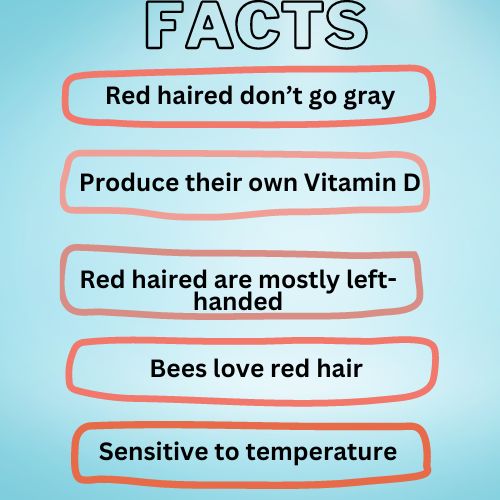
1. Red haired don’t go gray
One fascinating cool fact about African red hair is that they don’t get gray hair. When people with red hair lose their hair color pigment as they age, their hair takes on a gray or silver-tone.
However, that’s not the case with red hair – instead of going from red to gray, their hair goes from red to white.
2. Red haired produce their own Vitamin D
More enthralling is the fact that red hair people produce their own melanin concentration or vitamin D under low light conditions, as opposed to non-red hair who require either food or sunlight to make their own vitamin D. Insufficiency of Vitamin D affects nearly 50 percent of the world population
3. Red haired are mostly left-handed
Some research states that it is more likely for people with red hair to be left-handed due to them having the recessive trait. Like their hair color, only a few people are left-handed in the western hemisphere.
4. Bees love red hair
Bees love red hair. Scientists believe that this may be due to the bright pigmentation of their hair that resembles flowers. As such red haired are advised to complement this with shampoo, and you’ll be sure to attract even more than just bees.
5. Red haired have blue eyes
Although rare, there are some cool African kids who have red hair and blue eyes. This particular combination of hair and eye color are only found among a small percentage of the world population. The odds of having both of these traits are 0.17% which makes it extremely rare.
Both traits are recessive which makes it difficult to find in people. To make this possible, both parents must possess the gene for blue eyes as well as the MC1R gene.
6. Sensitive to temperature
People with hair are also able to sense changes in temperatures faster, a sensitivity that is more intense compared to those with darker hair colors. Scientists believe that this may be due to the red hair gene that has also mutated their senses.
Misconceptions About Black Redheads
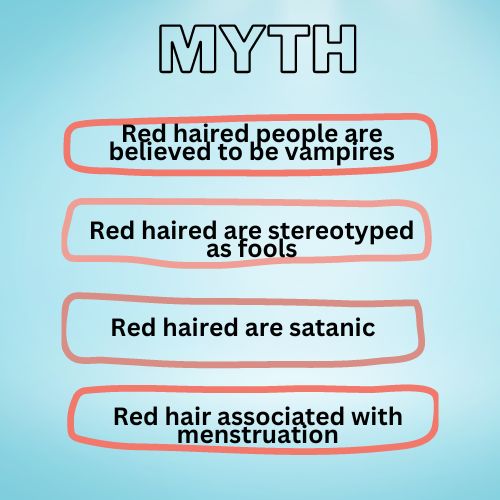
1. Red haired people are believed to be vampires
Ancient Greeks were afraid of those with naturally red hair, believing that they would become vampires after death. As such red haired slaves imported from northern territories were the others, different and wild ones, so red hair equaled “barbarian”.
The association between red hair and vampires goes far back to an Indo-European near the Black Sea. Today the Black Sea is bordered by Ukraine, Romania, Bulgaria, Turkey, Georgia, and Russia and in this region, Slavic mythology believes that red hair and gray eyes are regarded as vampires. The worrying perception is that red is the color of blood, therefore redness must predispose one to vampirism.
2. Red haired are stereotyped as fools
The ancient theater created a new stigma: red hair equaled “clown”. Those actors playing the fool had to wear a red-haired wig. You can trace a line of development from a character on the Greek stage to the modern red-haired circus clown and Ronald McDonald.
3. Red haired are satanic
This unfortunate comparison is due to red often being associated with the color of moral degradation and sexual desire. Aside from this disturbing imagery, the Monrovians of ancient Gaul once associated red hair with special magical abilities.
Later, during the time of the Spanish Inquisition (1478 – 1834), people believed that redheads were witches and had stolen the fire of Hell, which was considered a serious crime.
OCA1, the classical presentation of albinism, also happens and sadly many children born like this have been murdered in Africa because of beliefs in witchcraft.
4. Red hair associated with menstruation
During medieval times, many believed that menstrual blood was dangerous. Some even went as far as stating it was poisonous to a man’s phallus if they were to have intercourse.
If a child were to be conceived while the woman was menstruating, it is said that the child would be born with red hair. In extreme cases, some believed that this could also cause the child to become deformed.
Concluding thoughts…
Due to the small fraction of redheads in Africa, they are rarely seen.
Undoubtedly, being red-haired has its perks; being unique and astounding. But some may view this uniqueness negatively, due to misconceptions and stereotypes.
Blacks with red hair, as discussed, are just like every other human; although albinism, uncommon human genetics, mixed lineage, genetic disorders as well as the environment affects their skin tone and hair color. The outcome of these is that they experience various health challenges.
Misconceptions about red-haired people are belittling. These affect their mental health and sanity. They also experience ginger phobia from people; an intense fear or dislike for people with red hair.
It’s only humane to accept red-haired Africans as they are, for they’re just like us.
Read Related Articles:
- Why do Black People Have Big Lips?
- Why Do Black People like Hennessy?
- Why do Black People Wash Chicken?
- Why Do Black People Have Big Dicks?
- Why do Black People Sag Their Pants?
- Why Do Black People Have Big Noses?
- Why do People Wear Black to Funerals?
- Why Do Black People Have Yellow Eyes?
- Can Two White People Have a Black Baby?
- Why Do Black People Smell? A Myth or Truth!
- Why Do Black People Wear White to Funerals?
- Why Can’t Black People Swim? Truth or Misconception!
- Can Black People Get lice? Everything You Need to Know!
- Can Black People Get Hickeys? Everything You Need to Know!
- Can Black People Get Sunburn? Everything You Need to Know!
- Can Black People Have Blue Eyes? Everything You Need to Know!
- Can Black People Blush: A Fascinating Episode that will Make you Smile!
